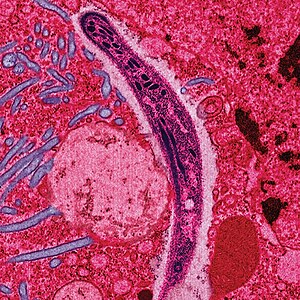Infectious Diseases
| Infectious disease | |
|---|---|
 |
|
| A false-colored electron micrograph shows a malaria sporozoite migrating through the midgut epithelia. | |
| Classification and external resources | |
| Specialty | Infectious disease |
| ICD-10 | A00-B99 |
| ICD-9-CM | 001-139 |
| DiseasesDB | 28832 |
| MeSH | D003141 |
Infection is the invasion of an organism's body tissues by disease-causing agents, their multiplication, and the reaction of host tissues to these organisms and the toxins they produce.Infectious disease, also known as transmissible disease or communicable disease, is illness resulting from an infection.
Infections are caused by infectious agents including viruses, viroids, prions, bacteria, nematodes such as parasitic roundworms and pinworms, arthropods such as ticks, mites, fleas, and lice, fungi such as ringworm, and other macroparasites such as tapeworms and other helminths.
Hosts can fight infections using their immune system. Mammalian hosts react to infections with an innate response, often involving inflammation, followed by an adaptive response.
Specific medications used to treat infections include antibiotics, antivirals, antifungals, antiprotozoals, and antihelminthics. Infectious diseases resulted in 9.2 million deaths in 2013 (about 17% of all deaths). The branch of medicine that focuses on infections is referred to as infectious disease.
...
Wikipedia
